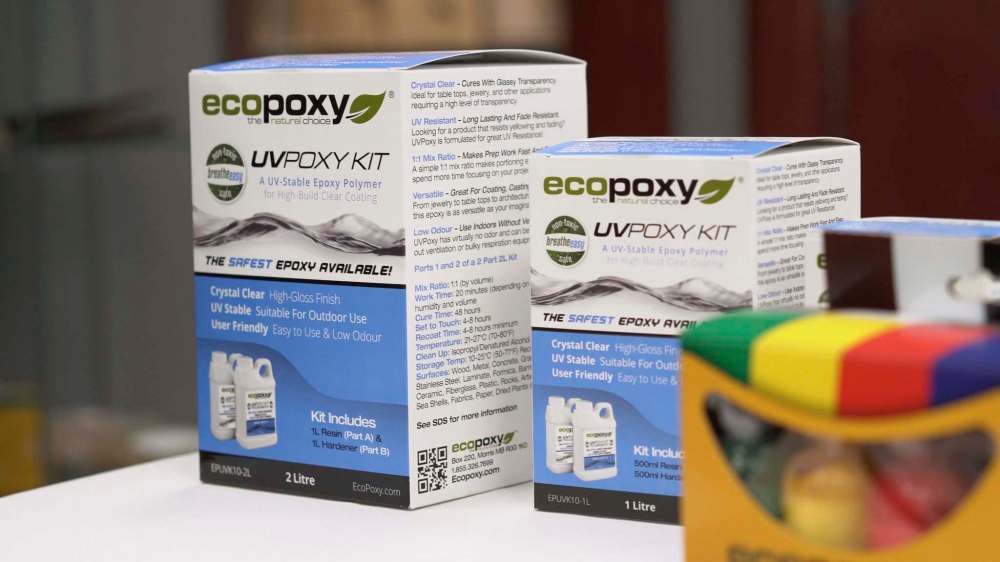Hutterite colony carving out epoxy niche
Community company, which creates unique products using bio-ingredients, receives $167,000 grant
Advertisement
Read this article for free:
or
Already have an account? Log in here »
To continue reading, please subscribe:
Monthly Digital Subscription
$0 for the first 4 weeks*
- Enjoy unlimited reading on winnipegfreepress.com
- Read the E-Edition, our digital replica newspaper
- Access News Break, our award-winning app
- Play interactive puzzles
*No charge for 4 weeks then price increases to the regular rate of $19.00 plus GST every four weeks. Offer available to new and qualified returning subscribers only. Cancel any time.
Monthly Digital Subscription
$4.75/week*
- Enjoy unlimited reading on winnipegfreepress.com
- Read the E-Edition, our digital replica newspaper
- Access News Break, our award-winning app
- Play interactive puzzles
*Billed as $19 plus GST every four weeks. Cancel any time.
To continue reading, please subscribe:
Add Free Press access to your Brandon Sun subscription for only an additional
$1 for the first 4 weeks*
*Your next subscription payment will increase by $1.00 and you will be charged $16.99 plus GST for four weeks. After four weeks, your payment will increase to $23.99 plus GST every four weeks.
Read unlimited articles for free today:
or
Already have an account? Log in here »
Hey there, time traveller!
This article was published 16/03/2018 (2834 days ago), so information in it may no longer be current.
A plant-based epoxy being developed on a local Hutterite colony has received a government grant to help take the product to the next level.
EcoPoxy, a company started by Oak Bluff Hutterite Colony east of Morris, was made beneficiary of a $167,000 grant this week from Growing Forward 2, a five-year federal-provincial-territorial initiative.
EcoPoxy uses mostly bio-ingredients to make an odourless epoxy, and the company is close to developing one made from locally grown soybeans.

“For a lot of woodworkers working out of their garage, with typical epoxies you practically poison yourself. Our product, you don’t even smell it. There are no solvents,” CEO Jack Maendel said.
As well, typical epoxies are made with petroleum that took thousands of years to form. “Our product is made from annually produced crops,” Maendel said.
Manitoba Agriculture Minister Ralph Eichler and MLA Cliff Graydon (Emerson) were on hand for Thursday’s press conference at the EcoPoxy premises on the colony.
Hutterite colonies are good at manufacturing for niche markets. In Manitoba, there are Hutterite colonies that make bike racks, picnic tables, fire pits, kitchen cabinets, fire engines, prefab homes, floor trusses, roof trusses, meat smokers, wood-fired stoves and graphic signage.
“There are too many colonies in woodworking and metalwork already. We didn’t want to be copycats. We wanted something unique, and it’s hard to find something unique anymore,” Maendel said.
The company has only been operating for a couple years. Its epoxy is currently used in floorings and furniture such as tables and countertops.
“River tables are huge. That’s where you have two slabs of wood with a gap in the middle, and you flood the gap with epoxy and it looks like a river, and you can pigment that any colour,” Maendel said.
The company also applies an epoxy coating to flooring in industrial trailers for local firm International Truck Body.
The grant money will be split 50-50 on equipment purchases. Half will be used to buy equipment for EcoPoxy’s lab. Currently, its lab outsources testing of each sample at $2,500 a crack with a three-week turnaround.
“That’s too long and too expensive,” Maendel said. Part of the grant money will be used to buy their own testing equipment, which will turn around results in 24 hours.
The other half of the grant will go towards purchasing a machine to fill the product into containers, which is currently being done manually.
EcoPoxy currently has 15 employees, five of whom are non-Hutterites.
“We have a chemist from Winnipeg, one from Steinbach, a sales manager from Morris, my assistant is from Morris,” Maendel said.
The grant will allow the company to hire two more employees, one from the colony and one from outside.

“We don’t have the expertise. When we don’t have the talent, we won’t hesitate to hire” outside the colony, Maendel said.
“The important work being done at EcoPoxy advances both our economic and environmental goals in agriculture, and builds on Manitoba’s strategic advantages,” Eichler said at the press conference. He called colony members “innovative Manitobans who are committed to capitalizing on new ideas and opportunities.”
The Oak Bluff colony started in 1952. It has always been dependent on agriculture, mostly on crop farming but also hogs. When its hog business collapsed about a decade ago, it went looking for something to replace it.
“We wanted to do something different because we didn’t like being blamed for polluting Lake Winnipeg, even though that isn’t true,” Maendel said.
It went searching for an ecology-themed business and had a few misses before it hit on bio-based epoxy. It has been developing plant-based epoxies for the past two years. Its epoxy is currently made with cashew oil, linseed oil (flax) and other bio-ingredients the company wishes to keep confidential.
The colony has partnered with a chemist to make epoxy from soybean oil. Soybeans are a relatively new and booming crop in Manitoba, but there is no local crushing capacity. Maendel hopes that crop production, along with processors such as EcoPoxy who use soybean oil, can convince investors to build a soybean-crushing plant in Manitoba.
“We grow soybeans, but we export them all to South Dakota, where they are processed into meal, and then we buy the meal back and feed it to our livestock,” Maendel said.
He said the research is about three-quarters of the way to producing a soybean-based epoxy.
EcoPoxy has about 70,000 followers on Instagram and is available at Artist’s Emporium in Winnipeg and Windsor Plywood stores across Western Canada, as well as Janzen’s Paint & Decorating stores in Winkler and Steinbach.
bill.redekop@freepress.mb.ca


